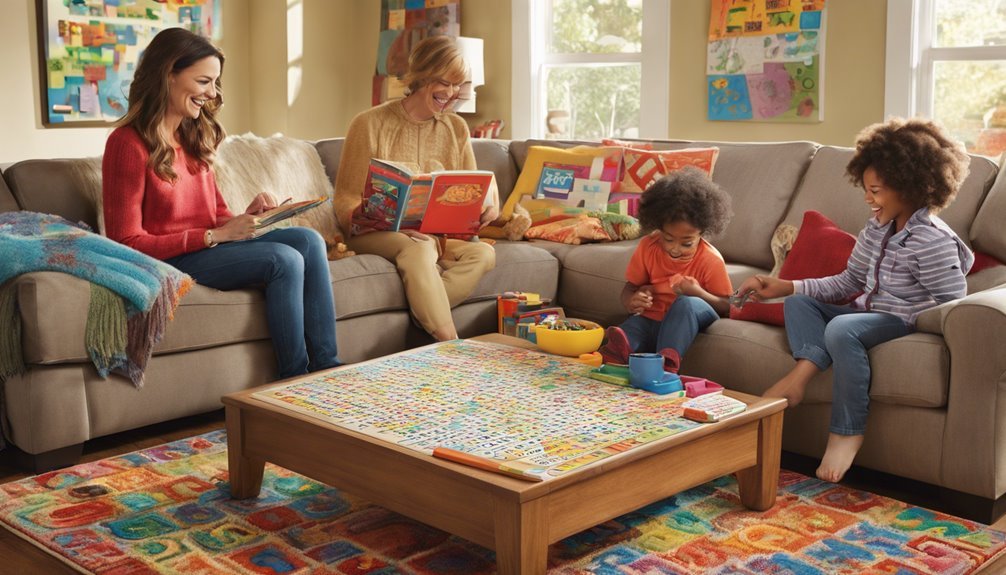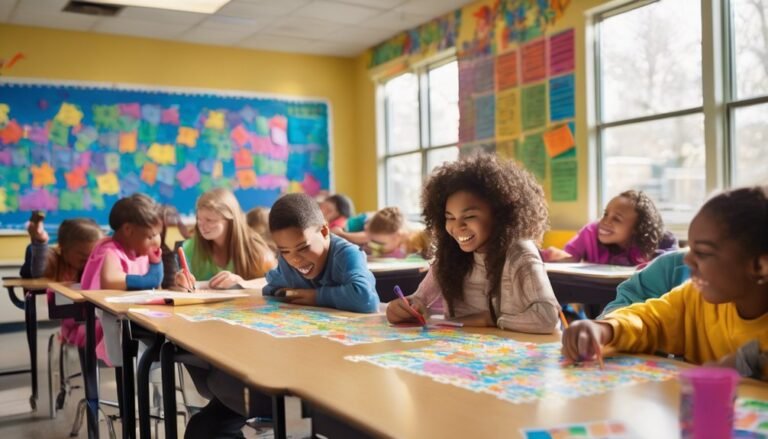The Benefits of Word Search Puzzle Books in Early Education
Word search puzzle books play a significant role in early education, enhancing various skills in children. By engaging with these puzzles, kids not only boost their vocabulary but also improve their spelling and problem-solving abilities. The repetitive nature of the activity reinforces critical language patterns, while also fostering analytical thinking. If you're curious about how these seemingly simple puzzles can have a profound impact on cognitive development, there's much more to uncover.
Key Takeaways
- Word search puzzles enhance vocabulary acquisition, exposing children to new terms and reinforcing retention through active engagement.
- They improve spelling skills by encouraging recognition of spelling patterns and sound-letter relationships through repetitive encounters.
- Word search puzzles boost problem-solving abilities, fostering cognitive development and analytical thinking through strategic decision-making.
- Engaging with these puzzles encourages critical thinking, helping children analyze information and develop essential problem-solving skills.
- Family engagement is promoted as word search puzzles create opportunities for collaborative learning and bonding during puzzle-solving activities.
Enhancing Vocabulary Acquisition
While children engage with word search puzzles, they're not just having fun; they're actively enhancing their vocabulary acquisition. As they search for words, they're exposed to new terms, which increases their language exposure.
This practice encourages vocabulary retention, as the repetitive nature of puzzles reinforces memory. When kids encounter unfamiliar words, they begin to develop contextual understanding, fostering a deeper grasp of language.
Research shows that interactive learning experiences, like word searches, improve cognitive engagement, making vocabulary learning more effective.
Improving Spelling Skills
As children dive into word search puzzles, they not only discover new words but also enhance their spelling skills. Engaging with these puzzles encourages them to recognize spelling patterns, which is crucial for developing phonetic awareness.
As you guide them through the activity, they'll start to notice how letters combine to form words, reinforcing their understanding of sound-letter relationships. This hands-on approach fosters a deeper connection with language, enabling them to decode unfamiliar words more effectively.
Practicing with word searches also promotes retention, as children repeatedly encounter the same words in different contexts. Ultimately, by integrating word search puzzles into their learning, you're equipping them with essential tools for mastering spelling, laying the foundation for their future reading and writing success.
Boosting Problem-Solving Abilities

Engaging with word search puzzles not only sharpens spelling skills but also cultivates children's problem-solving abilities.
These puzzles require you to identify and locate words within a grid, fostering cognitive development and enhancing analytical thinking. As you navigate the letters, you're not just searching; you're evaluating potential patterns and making strategic decisions. This process encourages a systematic approach to problem-solving, essential for later academic success.
Research indicates that activities like these stimulate neural connections, promoting mental agility. By regularly working on word searches, children learn to approach challenges creatively and persistently, skills that extend beyond the puzzle and into their daily lives.
Ultimately, mastering these puzzles lays the groundwork for stronger problem-solving capabilities.
Encouraging Critical Thinking
Critical thinking develops when children tackle word search puzzles, as these activities challenge them to analyze and synthesize information. Engaging with puzzles promotes cognitive development by encouraging kids to identify patterns, discern relationships, and make connections among words.
As they search for terms, they're not merely scanning letters; they're honing their analytical skills, which are essential for problem-solving and decision-making. This process cultivates a mindset that questions, evaluates, and interprets information critically.
Research shows that early exposure to such intellectually stimulating activities lays a strong foundation for future academic success. By integrating word search puzzles into learning, you're providing children with the tools to think deeply, fostering a generation of critical thinkers ready to navigate complex challenges.
Promoting Family Engagement and Learning

One effective way to boost family engagement in early education is through interactive activities like word search puzzles.
These puzzles not only promote literacy but also foster family bonding and collaborative learning. When you work together on word searches, you create opportunities for discussions, enhancing both understanding and enjoyment.
Here are four ways to maximize the benefits:
- Set Family Puzzle Nights: Dedicate time each week for puzzle-solving sessions.
- Incorporate Themes: Choose puzzles that relate to what your child is learning.
- Discuss New Words: After completing a puzzle, talk about the words and their meanings.
- Track Progress Together: Celebrate achievements, reinforcing a sense of accomplishment.
Engaging in this way lays a foundation for lifelong learning.
Frequently Asked Questions
Are Word Search Puzzles Suitable for All Age Groups?
Word search puzzles can be suitable for various age groups, as they cater to different cognitive development stages.
For younger children, these puzzles enhance vocabulary and promote engagement levels through fun patterns.
As you age, they can challenge your problem-solving skills and boost critical thinking.
How Often Should Children Do Word Search Puzzles?
How often should children do word search puzzles? Imagine your child's brain lighting up like a Christmas tree with each puzzle completed!
Engaging in word searches two to three times a week can yield significant cognitive development benefits. This frequency not only enhances vocabulary and pattern recognition but also strengthens problem-solving skills.
Can Word Searches Be Used in a Classroom Setting?
Absolutely, you can use word searches in a classroom setting. They boost classroom engagement by making learning interactive and fun.
As students search for words, they enhance their vocabulary and reinforce spelling skills. You'll notice that this activity keeps them focused and encourages collaboration when done in groups.
Incorporating word searches into your lessons can create a dynamic learning environment that promotes both individual and collective mastery of language concepts.
What Materials Are Needed for Creating Homemade Word Search Puzzles?
Creating your own word search puzzles is like weaving a tapestry of knowledge and fun. For puzzle creation, you'll need grid paper or a computer program, a list of words, and a pencil.
Educational tools such as markers or colored pencils can help highlight key terms. Don't forget a ruler for neat lines!
Are There Digital Versions of Word Search Puzzles Available?
Yes, there are numerous digital versions of word search puzzles available. These online puzzles offer great accessibility, allowing you to engage children anytime, anywhere.
Digital puzzle benefits include interactive features that can enhance learning and retention. Plus, many platforms provide options to customize difficulty levels, making it easier to tailor the experience for different age groups.
Conclusion
Incorporating word search puzzles into early education creates a vibrant tapestry of learning, where vocabulary, spelling, and critical thinking intersect. As children navigate through letters, they're not just searching for words; they're building skills that intertwine with their cognitive development. Picture families gathering around these puzzles, weaving connections through collaborative engagement. This simple activity transforms into a powerful tool, laying a sturdy foundation for literacy while making learning a dynamic, enjoyable experience that brings everyone together.







